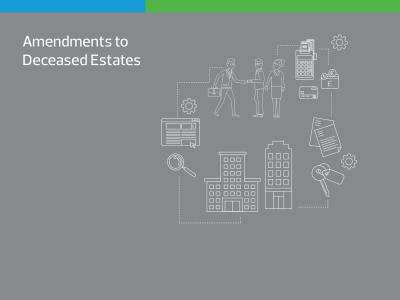Who says you have to be alive to be robbed?
As the old saying goes, forewarned is forearmed. The purpose of this article is to inform the reader of certain guidelines which can be followed to help identify possible fraud early, or better yet to prevent it from happening at all.
Dealing with the loss of a loved one is a traumatic experience on its own. In addition, one has to go through all the tedious administration involved in attending to and administering the winding up of the estate. Add fraud to the mix and it’s enough for anyone to have a meltdown.
Fraud in all industries seems to be an ongoing battle. It is increasing at an alarming rate, despite the efforts being made to curb it and increased internal compliance procedures being implemented by all regulatory bodies including banks. Unfortunately, deceased estates seem to be one of the many latest targets of fraud. It is only prudent that the responsibility to prevent fraud does not only lie with the professionals charged with winding up the deceased estate but also with the family members left behind.
One would think that even fraudsters have enough morals to respect the deceased’s dying last wishes but, truth be told, deceased estates have become an increasingly easy target for criminals. It is important that the deceased’s wishes be carried out and not the wishes of the criminals.
While it is proper for a family to pause and process the loss of a loved one during this time, it is important to note that at the same time, the criminal element does not pause. In fact, it is an invitation for criminals to take advantage during this stage while people are not at their most vigilant.
The very documents that are used to register and process a deceased’s estate at The Master of The High Court (Death Certificate, Identity Document copies and Inventory, which contain a detailed list of all assets that constitutes the value of the deceased estate), are the very documents that, if intercepted by criminals, can be used to make contact with most institutions to liquidate assets of the estate to the benefit of the criminal before one is even aware that these documents have fallen into the wrong hands. Only trusted parties should handle these documents from the time they are submitted to The Master for registration until the date of actual registration. Regular follow up should take place with The Master to ensure registration as the process can take in excess of a month.
Furthermore it is vital that the family members of the deceased immediately make contact with all institutions where the deceased’s assets are held. These will include insurance companies where the deceased held life and other policies as well as banks. This is of the utmost importance as everything that can be done to prevent fraud hinges on the family making contact with and making themselves known to these institutions as a matter of urgency. The purpose of this interaction with the institutions is to ensure that contact details and email addresses of the deceased are amended to reflect family members’ and/or the executor’s contact details for future correspondence. This eliminates the possibility of important information being sent to the deceased’s inaccessible email and postal address which can give rise to unnecessary time delays, and which ultimately could give the criminals the time they need to conduct fraud before anyone is even aware of it.
Once one has ensured that they are receiving statements and information updates from these institutions soon after the deceased’s passing, it is vital that they scrutinise these statements as soon as they are received to ensure no fraudulent activity is taking place on the accounts. All suspicious transactions reflected on the bank statements should be immediately reported to the relevant institution’s fraud division so that corrective steps can be taken to either prevent loss or at the very least to minimise it.
During the winding up process many institutions will request information from the deceased’s family and/or executor. One must make sure that the request comes from a legitimate source as criminals often pose as institutions in order to gain access to information which will assist them in committing fraud.
Lastly care should be taken to ensure that all the accounts of the deceased are closed properly, by requesting a closing statement from the relevant parties and that the correct values are transferred to the newly opened estate bank account from which all disbursements of the deceased’s estate will be paid.
Unfortunately in most instances, once fraud has been picked up and reported to the police and the commercial crime unit to open up a fraud case, the likelihood that the criminals have disappeared with most, if not all of the stolen funds from the estate is high. The probability of bringing them to justice then becomes more unlikely with each passing day as most of the criminal activity is being facilitated behind the scenes from a computer screen, with very limited public interaction. This results in a “faceless” crime with no witnesses, making it near impossible for the police to bring the criminals to justice. Sadly for the grieving family, this means the case never sees the inside of a court room and just remains an unsolved fraud case with the police.
The above is only a broad overview of guidelines one can follow to prevent fraud. While on the surface they look simple and are a product of common sense, their effectiveness will only be as good as the vigilance of the all the relevant parties concerned with implementing the stated guidelines. The key word is vigilance and not just solely relying on information on face value. The only questions you will regret in this exercise are the ones you never asked.




